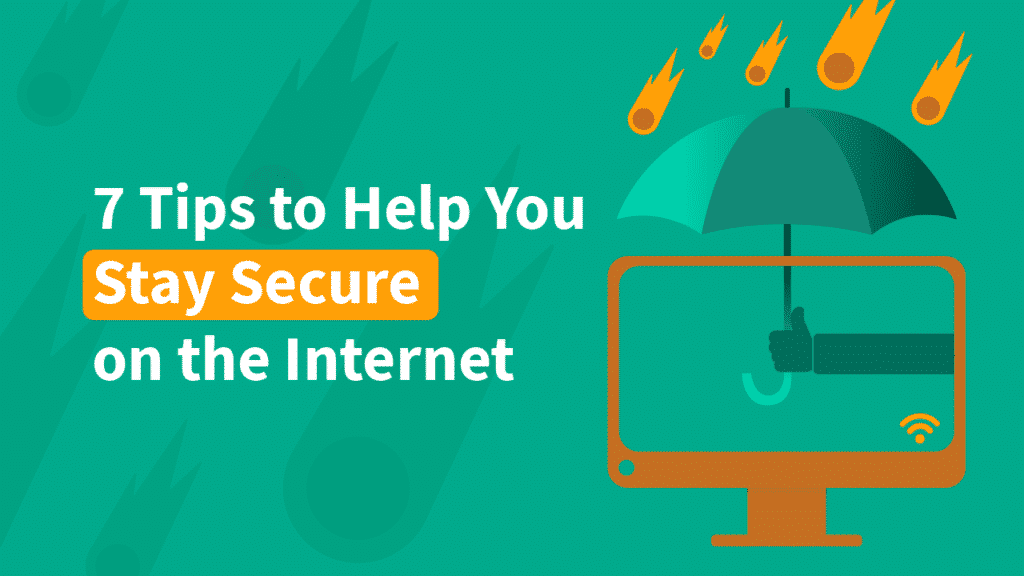7 Tips to Help You Stay Secure on the Internet
Data and privacy loss, hacking, and malware attacks are part of the security issues you can face while using the internet. Even ISPs and companies collect private data that they can sell to advertising companies to create “personalized” ads. This is why it is essential to take extra measures to help you stay secure while using the internet. Here are seven important tips for staying safe online.
1. Use Strong Passwords
Many times, people who fall victim to hackers and identity thieves do so because they use weak passwords. Passwords like your birthday, dog’s name, or “123456” are easy to predict and can put you at the risk of identity theft or fraud. One of the best ways to stay secure on the internet is to use strong and unique passwords for your critical accounts. You can create a series of words or combinations that are very hard to predict by others.
A strong password should have a combination of letters, symbols, and special characters and should be at least 8 characters long. Also, you should use unique passwords for every account. Using the same password for your accounts puts you at risk. If one account gets compromised, all of them could get compromised. You can use a password manager to generate and store your passwords.
2. Two-factor Authentication
Another way to stay secure on the internet is two-factor authentication. This requires you to periodically verify your identity after logging in through your username and password. You can be asked to enter a code sent to your email or phone or asked to answer a security question. This will help to protect you against identity theft and data breaches as it creates a second layer of protection.
3. Always Use Up-to-Date Software
It is vital to make sure your devices use up to date software. Ensure you download security fixes and software updates for your web browsers and operating system. When you have the latest security patches, you are at a lesser risk of falling victim to security holes. You can turn on automatic updates, so you do not have to update manually each time.
4. Avoid Unsecure Websites and Strange Links
When visiting websites or performing online transactions, ensure the site’s address starts with HTTPS instead of HTTP. Secure websites with HTTPS have a padlock icon in the URL bar, indicating that the website uses secure encryption to protect your data so that it can’t be intercepted. Also, avoid websites with misspellings or bad grammar in the URL address. They are often copycats of legitimate malware and could be infested with malware.
When you receive a link from an unknown source, never click on the link till you validate it. To prevent your financial information from being compromised, do not store your financial information on shopping websites or perform online transactions on unreliable websites.
5. Avoid Unsecure Networks
Public Wi-Fi can put you at massive risk, as many of them may not be encrypted. When you connect to public networks, anyone armed with enough knowledge can intercept and monitor your internet activity. They can view the websites you visit and the information you offer to those websites. If you need to use public Wi-Fi, ensure you have a firewall enabled. Also, do not perform sensitive transactions or enter compromising information like your financial information or social security number.
6. Avoid Suspicious Emails
When you get emails requesting personal information or urgent requests for money, ensure you do not reply or click any link included in the message. Hackers often try to copy message formats from legitimate sites or financial institutions and may ask you to supply sensitive information. Also, emails containing suspicious offers, prizes, and gifts that seem too good to be true are usually a means to install malware or ransomware on your device.
If you receive a suspicious mail, do not download any file attached to it. At times, malware can be disguised as a Yes/No question to fool people. This is why you should avoid opening messages from suspicious sources.
7. Avoid Sharing Sensitive Information
Oversharing on the internet can put you on the risk of identity theft, doxxing, and data breaches. Be careful of what you share online as cybercriminals only need bits and pieces of your information to do significant damage. Never share personal information with strangers or on websites.
Conclusion
When it comes to privacy and security protection on the internet, prevention is always better than cure. The damage done may be greater than what it would cost to take the right security measures now. You can secure your device and personal information when using the internet by following the tips we have listed above. Apart from these tips, it is crucial to stay up to date with new scams and data-stealing methods to protect yourself from them.
